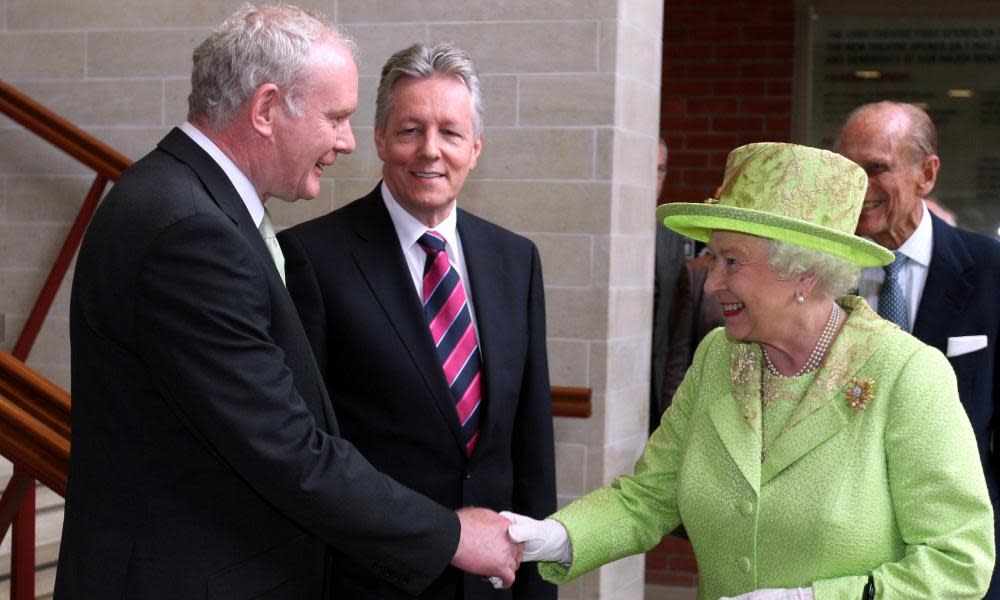Forgiving Martin McGuinness is not an act of weakness but of power | Suzanne Moore

As Martin McGuinness’s coffin is hoisted, the man remains completely unforgiven in many quarters. How do we talk of someone who ordered killings and then ordered them to stop? Does one thing cancel out the other? Clearly not for some: Norman Tebbit wakes up every day with his wife who cannot get out of bed, who needs full-time care because of the Brighton bomb. Lord Tebbit hopes that McGuinness is in “a particularly hot and unpleasant corner of hell”. He has long said he cannot and will not forgive. There is something brutal and primal about Tebbit’s honesty and pain. I cannot judge, but it makes me think about the value of forgiveness.
There is no forgiveness in a paper such as the Daily Mail, where McGuinness is simply a mass murderer. Pictures of the carnage he authorised sells papers in England. Its Irish edition is, of course, completely different and more respectful of his death. Profit trumps principle. There is an absolute refusal on that part of the right to see McGuinness as integral to any peace process. The narrative is familiar: the IRA was defeated; the British behaved as a neutral force in Ireland. The civilians shot by soldiers on Bloody Sunday were “terrorists ”; the radicalisation of a generation by republicans because of British militarised occupation is never accounted for. The basic republican position – that the partition and division in Ireland was caused by the British – is not discussed.
Without it, though, how to comprehend much of what has been said? One does not have to accept the republican narrative of a noble anti-colonial struggle against the Brits but, without any truth acknowledged, this part of history really does not make sense. Nor does the fact that this “struggle” was mostly run by a bunch of misogynist gangsters, as so often is the case with so-called freedom fighters. Forgiveness is surely related to knowing why people did what they did. As the Northern Ireland Peace Monitoring Report said in 2014: “The war of narratives has replaced the war of weapons.” It goes on to say this is all a “tapestry of complex weaving”. Indeed.
Seeing the reaction to McGuinness’s death is to watch that ongoing struggle over the narrative. Some of it is sectarian, stony, unforgiving; some of it is moving … because, somehow, people have moved on. The Queen will write to McGuinness’s widow; Ian Paisley Jr talked of his father’s relationship with McGuinness. Some of it is self-serving. McGuinness was no Mandela, let’s be clear, but Blair and his cronies popping up to take credit for the peace process (again, Britain is the neutral broker in “the Troubles”) has been extremely odd. It seems to be part of some Blairite rehab scenario that this was a government of peace–broking, rather than a government that took us to war in Iraq. This latter act remains absolutely unforgiven, there is no other way to put it.
All sorts of omissions have to be made to see Blair, Campbell et al as the sole bringers of peace to a troubled Ireland. In fact, McGuinness was first flown over to London to talk to the then Northern Ireland secretary, Willie Whitelaw, in 1972. Mo Mowlam’s bravery and flair appears to have been written out of the Blairite narrative. What has been achieved in Ireland is not because of the largesse of the British government, but because of a process that is still happening. It is about realising that forgiving is not the same as forgetting, that sectarian murderers may walk free, that some poor people may never know where their dead are, that vengeance may not be theirs, that their children will grow in a different world. This is incredibly hard. The personal response of the victims’ relatives is more honest and far more nuanced than the images of McGuinness as republican saint or murderous terrorist that we are being asked to choose from.
Colin Parry’s 12-year-old son Tim was killed by an IRA bomb in Warrington. Fifty-four other people were injured. McGuinness went to meet him in 2002 and Parry said that he and his wife could never forgive him or the IRA but, “setting aside forgiveness”, he found McGuinness easy to talk to and sincere in his desire for peace. He got to a point where he liked him.
This is remarkable, is it not?
Forgiveness has been spoken about lately in terms of the ability of women to forgive their rapists. I have found the discussion of this extremely uncomfortable, as much as I understand the therapeutic language of healing. Forgiving seems to be a way of removing self-blame, yet we live in a culture where often women are encouraged to forgive abuse in the name of a happier relationship. Forgive who? Is forgiveness located in the individual or in the culture?
For I see no other way to talk of the life of a man such as McGuinness. Forgiveness no longer seems like a spiritual strategy but a pragmatic one. In a world of conflict, forgiveness is not an act of weakness, but of power. It never diminishes the wrong; it is not denial. There can be no denial of what McGuinness was or what he did. The truth is troubling. But is there another way forward? No.

 Yahoo News
Yahoo News 
